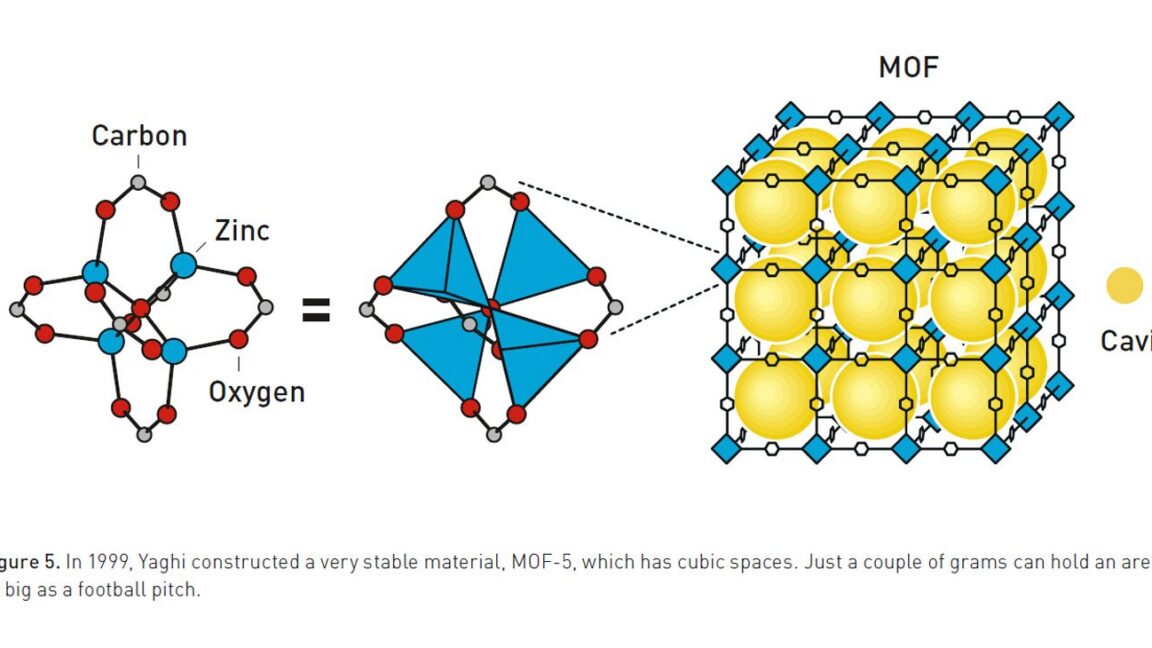Science
Nobel Prize Honors Pioneers in Metal-Organic Frameworks Development

The Nobel Prize Committee recognized three researchers on October 4, 2023, for their groundbreaking work in the field of metal-organic frameworks (MOFs). The award was given to Richard Robson, Susumu Kitagawa, and Omar Yaghi for their innovative contributions that have transformed our understanding and application of polymers.
Transforming Polymer Chemistry
Polymers, which form the basis of various materials around us, are typically disordered structures made of long chains of atoms tangled together. Since the early 1990s, chemists have been developing techniques to create polymers with precisely defined architectures, leading to the emergence of MOFs. These structures possess unique properties, including large pores for gas filtration and storage, along with catalytic centers that enhance chemical reactions.
Robson, who conducted his pioneering work at the University of Melbourne, produced the first MOF using copper as the metallic component. His innovative approach involved linking copper to an organic molecule characterized by a rigid benzene ring, which maintained its structure. This combination allowed the framework to grow in a three-dimensional manner, reminiscent of stacking pyramids. Notably, the internal cavities of his MOF remained filled with solvent, showcasing its capacity to allow free movement of certain molecules.
Robson’s initial findings predicted several critical features of MOFs, including their stability after solvent removal and their ability to function as filters and catalysts.
Expanding Horizons in Material Science
The potential of MOFs quickly gained traction in the scientific community, thanks in part to Susumu Kitagawa from Kyoto University. Kitagawa and his team developed a MOF with extensive internal channels that could facilitate gas flow. This material demonstrated the ability to retain gases such as oxygen, nitrogen, and methane when dried. Kitagawa also envisioned future advancements, including MOFs capable of altering their properties in response to external stimuli, a concept that has since materialized.
Omar Yaghi, who began his journey as a Palestinian refugee and progressed through various academic institutions, has emerged as a leading figure in MOF research. Now a professor at the University of California, Berkeley, Yaghi has created MOFs that are not only stable at high temperatures but also feature customizable pore sizes. His notable innovations include a MOF designed for selective carbon dioxide absorption, potentially aiding in mitigating greenhouse gas emissions, and another capable of harvesting water from arid environments overnight, which it releases when heated by sunlight.
The versatility of MOFs is reflected in the vast array of synthesized materials, with their Wikipedia page exceeding 20,000 words. While these advances may not capture public attention outside prestigious recognitions like the Nobel Prize, the applications of MOFs are extensive. They play crucial roles in hydrogen storage, carbon dioxide filtration, and catalyzing various chemical reactions.
The recognition by the Nobel Prize Committee serves as a testament to the significant impact of MOFs, highlighting the importance of research that, while often working behind the scenes, holds the potential to address some of the world’s most pressing challenges.
-

 Science2 months ago
Science2 months agoToyoake City Proposes Daily Two-Hour Smartphone Use Limit
-

 Health2 months ago
Health2 months agoB.C. Review Reveals Urgent Need for Rare-Disease Drug Reforms
-

 Top Stories2 months ago
Top Stories2 months agoPedestrian Fatally Injured in Esquimalt Collision on August 14
-

 Technology2 months ago
Technology2 months agoDark Adventure Game “Bye Sweet Carole” Set for October Release
-

 World2 months ago
World2 months agoJimmy Lai’s Defense Challenges Charges Under National Security Law
-

 Technology2 months ago
Technology2 months agoKonami Revives Iconic Metal Gear Solid Delta Ahead of Release
-

 Technology2 months ago
Technology2 months agoSnapmaker U1 Color 3D Printer Redefines Speed and Sustainability
-

 Technology2 months ago
Technology2 months agoAION Folding Knife: Redefining EDC Design with Premium Materials
-

 Technology2 months ago
Technology2 months agoSolve Today’s Wordle Challenge: Hints and Answer for August 19
-

 Business2 months ago
Business2 months agoGordon Murray Automotive Unveils S1 LM and Le Mans GTR at Monterey
-

 Lifestyle2 months ago
Lifestyle2 months agoVictoria’s Pop-Up Shop Shines Light on B.C.’s Wolf Cull
-

 Technology2 months ago
Technology2 months agoApple Expands Self-Service Repair Program to Canada









